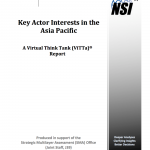Key Actor Interests in the Asia Pacific – A Korea Strategic Outcomes Virtual Think Tank Report
[Q8] How do key actors in the Asia Pacific (Australia, China, Indonesia, Japan, Malaysia, North Korea, Philippines, Russia, South Korea, and the United States) define their key national interests / regional objectives in Northeast Asia and the Western Pacific? What are seen by each actor to be the major threats to each interest? Are there any redlines associated with these interests?
This publication was released as part of SMA’s Strategic Outcomes in the Korean Peninsula project. For more information regarding this project, please click here.
Authors: Dr. Allison Astorino-Courtois, Weston Aviles, Dr. Belinda Bragg, Dr. Larry Kuznar, Nicole Peterson, George Popp, and Dr. John Stevenson (NSI, Inc.)
Summary Response
This summary explores the national interests and regional objectives of seven key actors (Australia, China, Indonesia, Japan, Malaysia, North Korea, Philippines, Russia, South Korea, and the United States) in the Asia Pacific region. The interest tables below outline these key national interests and regional objectives for each actor, first identifying the actor’s specific regional interests, then providing a more detailed description of each interest, and finally coding each interest by interest type (national security, economic, international prestige, domestic political, and/or identity). An individual, stand-alone interest table is presented for each actor.
The interest tables were developed using two primary sources of information: 1) insightful written responses from eight Korea Strategic Outcomes Virtual Think Tank (ViTTa) subject matter expert contributors, each of which are presented in full in the Subject Matter Expert Response Submission section of this report and are well worth reading in their entirety, and 2) supplemental open source research conducted by the authors. In-text citations are used within the interest tables and expanded reference lists are provided immediately following each interest table.
Subject Matter Expert Contributors
Dr. Stephen Blank, American Foreign Policy Council; Dr. Richard Cronin, Stimson Center; Dr. Rod Lyon, Australian Strategic Policy Institute; Shihoko Goto, Wilson Center; Anthony Rinna, Sino-NK; Dr. Sheila Smith, Council on Foreign Relations; Yun Sun, Stimson Center; Kelly Wadsworth, University of Pittsburgh
This publication was released as part of SMA’s Strategic Outcomes in the Korean Peninsula project. For more information regarding this project, please click here.

Comments